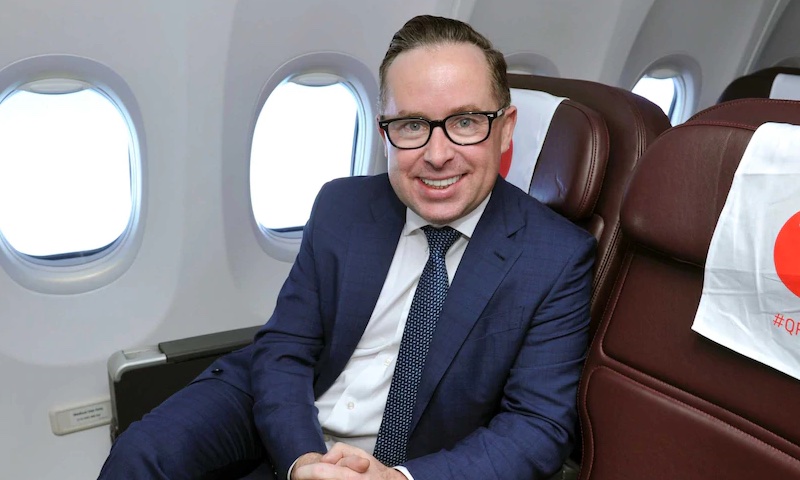It’s a familiar story at pandemic mendicant Qantas. An arrogant chief executive, a gravy train for his sidekicks, a kick in the teeth for airline workers and a right royal runaround for passengers, writes Michael Sainsbury.
It seems hard to fathom but Qantas is gearing up to inflict even more chaos on its long-suffering customers. Its union-loathing chief executive Alan Joyce is preparing to battle engineers critical to the company’s operations, as well as the company’s outsourced baggage handlers.
Their crime? Seeking wage rises that do not even keep up with cost-of-living increases on multiple fronts while Qantas executives took home $1.5 million in bonuses last year despite a $1.7 billion loss. The company’s board also saw its six-figure payments rise 5.2% to a collective $2.4 million.
Rooing the day: Qantas passengers and crew taken for a ride by the board
That’s because, the company said, its share price outperformed other global airlines last year according to Qantas’s annual report. Never mind that it was oversold at the start of the pandemic. Or that the share price rise was achieved in large part by instituting a company-wide pay freeze (except executive bonuses), and sacking 3500 workers.
Customers left high and dry
In the meantime, airline customers are being left high and dry by governments and regulators as the airline has been allowed to run rampant following its privatisation and multibillion-dollar Covid payments, gifted to it by the Morrison government with no industry-specific guarantees for consumers.
The latest threat to customers came as Qantas unveiled its latest outsourcing contract, only weeks after it denied to MWM that such a plan was on foot. Canadian airline services group CAE will build and operate a flight-simulation centre with property group LOGOS. CAE already provides all training for Jetstar. It is unclear how much of its pilot training Qantas will outsource in coming years; getting straight answers from the company is tough.
But pilots who spoke to MWM were concerned about the company losing control of its pilot training. “They are doing this to save money and potentially at the expense of safety,” said one pilot, who asked to remain anonymous.
As Qantas struggles to fill the gaps left by a vicious program of staff layoffs during the pandemic, the airline once more cranked up its formidable public relations machine. Last week, it wheeled out senior executives including Joyce working / cosplaying as ground staff. The mainstream media duly fell for Joyce on the tarmac in high-viz.
But this week’s show by Joyce and co came as Qantas engineers prepare to begin industrial action as early as this week. The company’s chief executive may well be, perhaps not so secretly, rubbing his hands together. For if there is one thing that the Irish-Australian loves, it’s a stoush with unions. In fact he has built his career on such battles.
But this time it is unlikely to go as well as it did for Joyce when he grounded the airline in 2011. The overall labour market, including that for highly qualified engineers, is tighter both locally and around the world. Requirements for engineers in Australia to have up-to-date experience are more stringent and Joyce has already sacked 30% of the company’s engineers as part of his pandemic staff purge.
“We’ve been negotiating with the airlines for years, and they simply will not put a [suitable] wage offer other than the one on the table and our members are aware that CPI is above 5%,” Steve Purvinas, federal secretary of the Australian Licensed Aircraft Engineers’ Association (ALAEA), told MWM.
“What we’re after is 12% over four years, or 3% per annum. This is at the bottom end of the Reserve Bank’s target range and a very reasonable outcome that the engineers would settle for and avoid any industrial dispute.”
Pay freeze for staff
The association has offered to go with Qantas to have the Fair Work Commission determine their wage increase, but Joyce has refused, knowing that the FWC bases its finding on the Consumer Price Index which is running well ahead of Qantas company wide offer of 2% for two years (following a two-year blanket pay freeze for staff).
“We’ve been left with no choice because Joyce won’t put a fair wage offer on the table,” Purvinas said. ”By the end of this month we will have commenced industrial action (which the union must do under industrial rules) and our first action will be one minute stoppages at the Jetstar network and Qantas. We are doing that, because we want management to take us seriously and come back to the negotiation table and put a reasonable offer before us,” he added.
We have offered Qantas to avoid industrial action, for both parties agree to go to the Fair Work Commission to let them decide what a fair outcome would be. And Qantas were not interested in doing so.
One-minute stoppages are sure to escalate into longer stoppages but Purvinas said that while his members are keen to avoid too many disruptions for customers, that is ultimately a choice that Qantas management would make if it insists on making an unpalatable offer that would be, even in a best case scenario, less that cost-of-living increases.
Industrial action is also brewing at Dnata, one of the two firms – along with Swissport – to which Qantas has outsourced the vast amount of its baggage handling.
“Dnata workers are overworked, exhausted and understaffed as they battle to plug gaps in working rosters,” Transport Workers Union national assistant secretary Nick McIntosh said. “They reasonably deferred bargaining during the pandemic despite not receiving a cent of JobKeeper, and now just want a fair deal for themselves and their families.
Workers send a message
“Workers are sending Dnata and its purse-string controllers at Qantas a clear message: settle a fair deal that locks in secure jobs with strong conditions, or workers may be forced to take further action.
“The problem here is that when Qantas says jump, these third-party labour-hire companies in aviation ask ‘how high’ just so they can keep the contract. Dnata workers are just the latest casualty in the Joyce-led administration’s moves to wring aviation contracts dry, with working men and women expected to accept a shoddy deal while wealthy executives live the high life.”
So Qantas customers, who have already experienced dire six months of queues, delays and missing baggage, should expect no improvement in Qantas’s standards and on-time efficiency.
The chaos at Qantas only serves to underscore that these problems for travellers are ongoing. Despite handing the airline billions of dollars in subsidies to prop it up during the pandemic there are no specific protections or service guarantees for passengers. In this Australia lags the developed world. In the European Union, New Zealand and even the United States there are airline-specific rules for consumers.
The situation was summarised in a submission to the Australian Consumer Law review in 2016:
The Australian Consumer Law provides consumers with robust rights to a refund or other remedy if a seller cannot provide the service that has been paid for. This general proposition also applies to airlines however, consumers are also subject to the airline’s non negotiated contract usually described as its “Conditions of Carriage”. These conditions include provisions that expressly provide that flight times are not guaranteed. As an airline can therefore lawfully change and reschedule flight times for weather or operational or engineering reasons at any point after booking and prior to departure, and given flight times are not an essential term of the contract, consumers aren’t automatically entitled to a refund or other compensation under the ACL.
Yet nothing has changed since.
Europeans do it better
There is a problem with the Australian consumer law, which became clear in the context of Covid. There are consumer guarantees, but they don’t necessarily apply if the reason that a service wasn’t provided was due to a factor beyond the control of the business. So if an airline couldn’t fly because there were Covid restrictions then they were not required by law to give you a refund because it was outside their control. It all came down to the individual airline’s terms and conditions.
“In the EU, there are really clear, clear rights that if your flight is delayed you’re entitled to certain types of compensation,” said Alan Kirkland, chief executive of consumer advocacy group CHOICE. “The compensation changes depending on the duration of the delay. But there’s just absolutely nothing like that in Australia. The big issue is that we have no automatic rights for cancellations, changes or baggage delays.”
”If you are an Australian traveller, if you’ve got a multi-leg flight, you have your rights on different legs – if you have a flight from an EU airport and it’s delayed, then you’ll have rights for that leg.
“We think Australian consumers should have similar rights to people in the EU with really clear compensation rights where flights are delayed or cancelled,” Kirkland adds, saying that more generally “we have been calling for much clearer rights for consumers to refunds and compensation when travel arrangements in general, including flights are delayed or cancelled.
“The Airline Customer Advocate was set up by government a while ago and is a voluntary scheme but it is inadequate. It has no power. If you are not happy with an airline, you can go to the ACA – and they send it back to the airline. It’s not an ombudsman scheme like there is for financial services or telecommunications, for instance. It’s toothless.”
It’s not just the well-remunerated head honchos that the airline dragooned into working as baggage handlers and ground staff, it’s everyone in its corporate offices. And Joyce, with his $100 million in salary during his time at the airline – and counting – tucked away, is not paying.
What’s more, junior staff – in fact anyone looking to get ahead at the company – are afraid to say no to “requests” they work unpaid shifts to make Joyce look good, people inside the company have told MWM.
Corporate staffers also dismissed the well publicised antics of their big bosses. “They just show up for a social media photo op and that’s it,” one employee said. (No-one, of course, is game to be named due to fear of retribution).
It’s not just unionised staff. There is company-wide dismay with the hefty pay rises the very top end of the company have been handing themselves.
Further down the tree, employees are being set targets universally described by staff who spoke to MWM as unattainable. “We haven’t had pay rises for three years and we can’t see one coming any time soon,” was a typical response.
That’s beyond the 2% Joyce is offering, per year, over the next three years. Joyce’s offer is below average wage rises in Australia over the past year, revealed as 2.6%.
One thing is almost certain: executive pay and bonuses are likely to be better than last year’s.
Michael Sainsbury is a former China correspondent who has lived and worked across North, Southeast and South Asia for 11 years. Now based in regional Australia, he has more than 25 years’ experience writing about business, politics and human rights in Australia and the Indo-Pacific. He has worked for News Corp, Fairfax, Nikkei and a range of independent media outlets and has won multiple awards in Australia and Asia for his reporting. He is a fierce believer in the importance of independent media.

